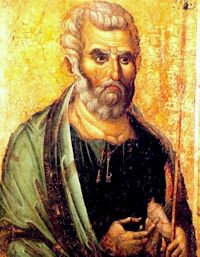Jesus and His Father’s Will
January 29, 2015 by Dan Burke
Jesus and His Father’s Will
Presence of God– O Jesus, teach me to follow You in Your life of total, perfect adherence to the Father’s will.
MEDITATION
“Wherefore when He cometh into the world, He saith [to the Father]: ‘sacrifice and oblation Thou wouldst not; but a body Thou hast fitted to me…. Behold, I come … that I should do Thy will, O God’” (Hebrews 10:5-7). These words reveal the constant interior disposition of Jesus with regard to His Father’s will. When the Apostles begged Him to take a little food, the divine Master replied, “I have meat to eat, which you know not…. My meat is to do the will of Him that sent Me” (John 4:32, 34). The only desire of Jesus and the source of His strength is the fulfillment of His Father’s will. The human will of Jesus is so perfectly transformed and so completely lost in the will of God, that He acts only under the influence of this will. “I came down from heaven, not to do my own will, but the will of Him that sent me” (John 6:38). “I seek not My own will, but the will of Him that sent Me” (John 5:30). In these words Jesus reveals the dispositions of His soul, the profound reason for all His acts and the rule which guided His whole life on earth, even to His sorrowful Passion, when He repeated, in spite of all the repugnance of His human nature, “Father … not My will, but Thine be done” (Luke 22:42).
COLLOQUY
O Jesus, would that I could understand, however slightly, Your perfect union with Your Father’s will! It is a union, not only profound, but unchangeable, for I know that You, as God, can have no will but Your Father’s, and as Man, Your will does not depend on a human ego, but belongs directly to Your divine Person. Such union can exist only in You, the Incarnate Word; yet the more I contemplate it, the more I desire to reproduce in myself at least a few of its characteristics. O Jesus, it is You who fill me with this desire, for You became our Brother and Model, that we might become like You. Did You not teach us to say to the Father: “Thy will be done on earth as it is in heaven?” Just as the divine will is realized perfectly in the heaven of Your holy soul, so may it also be accomplished in the little heaven of mine!
“O good Master, You know that nothing is of more profit to me than to consecrate my will to the Father’s. You teach me to do this, knowing that it will win Your Father’s heart, and You also teach me how to serve Him. You have made Yourself my intermediary and have even said in my name: ‘Thy will be done.’
“O Divine Father, after Your Son has consecrated to You my will, together with the wills of all, it would be unreasonable for me to refuse to give what He has offered.
“O Lord, what power there is in this gift of my will! If made with due determination, it cannot fail to draw You, Almighty God, to become one with our lowliness, to transform us into Yourself, and to unite the creature with the Creator…. O my God, the more You see by our actions that the words we use when speaking to You are not words of mere politeness, the more You draw us to Yourself and raise us above all petty earthly things. Not content with having made our soul one with Yourself, You begin to cherish it and to reveal Your secrets to it….
“At this very moment, O Lord, I consecrate my will to You, freely and unreservedly!” (cf. Teresa of Jesus, Way of Perfection, 32).

